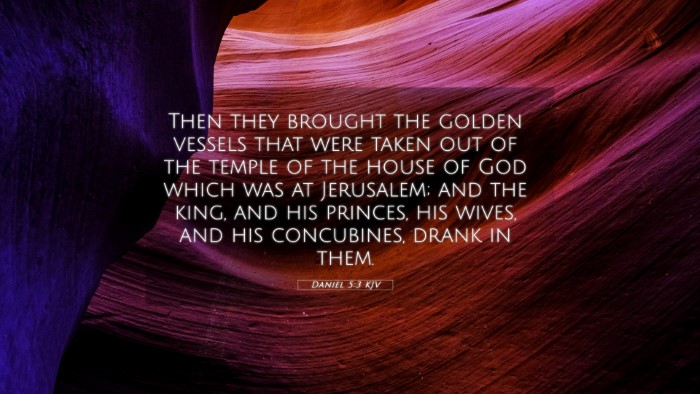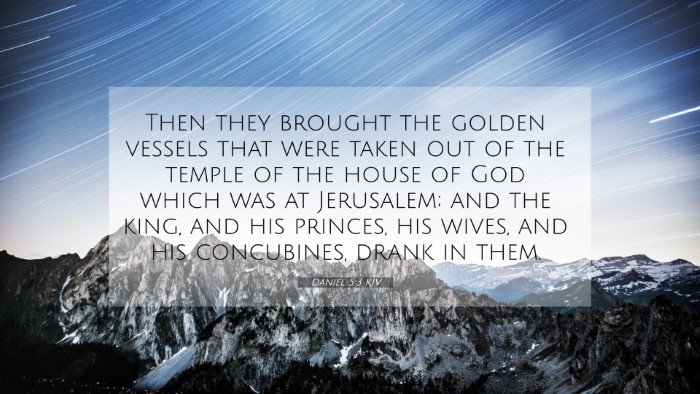Understanding Daniel 5:3
The book of Daniel is rich in themes of divine sovereignty and judgment, and Daniel 5:3 serves as a pivotal moment in the narrative. This verse states, "Then they brought the golden vessels that were taken out of the temple of the house of God which was at Jerusalem; and the king and his princes, his wives, and his concubines drank in them." This act signifies a profound disrespect toward God as the Babylonian king Belshazzar indulges in revelry using sacred objects.
Key Insights from Commentaries
-
Matthew Henry:
Henry emphasizes the brazen impiety of Belshazzar, who not only defiled sacred vessels but also intended to provoke the God of Israel. He notes that this act reflects a critical misstep as the king ignores the history and warning presented through God's previous judgments on nations.
-
Adam Clarke:
Clarke discusses the significance of the vessels themselves, which were dedicated for holy use. He points out that their misuse illustrates a broader theme of idolatry and a lack of reverence for God, emphasizing how the king's actions brought about divine judgment.
-
Albert Barnes:
Barnes highlights that the gathering of the king and his nobles to drink from these sacred vessels symbolizes a deeper spiritual decay within Babylon. This act is not merely a party but an affront to God, pointing out that such irreverence leads to inevitable consequences.
Thematic Connections
Daniel 5:3 connects deeply with themes of divine authority and the futility of human power in rebellion against God. This moment foreshadows the coming judgment detailed later in the chapter, where Belshazzar learns that his days are numbered (Daniel 5:26-28). The act of using sacred objects for profane purposes signifies a misunderstanding of holiness and the nature of God.
Cross-References
To fully grasp the significance of Daniel 5:3, consider the following cross-references:
- Exodus 30:29: Discusses consecration and the sanctity of items used in worship.
- Isaiah 47:10-11: Provides a warning against pride and the impending judgment of Babylon.
- Jeremiah 51:57: Reveals God's intent to punish the wise men of Babylon.
- 1 Peter 2:9: Highlights the royal priesthood, drawing parallels to the respect for sacred things.
- Matthew 5:13-16: Reflects on the witness of the people of God, contrasting with Belshazzar’s actions.
- Revelation 18:2: Describes the fall of Babylon, linking to Belshazzar's ultimate fate.
- Proverbs 16:18: States that pride goes before destruction, relevant to Belshazzar's arrogance.
Connections Between Bible Verses
In the context of Bible verse cross-references, Daniel 5:3 can be viewed as a culmination of God's warnings throughout the Scriptures. The king's feast can be connected to other instances of divine judgment on nations that dishonored God (e.g., the destruction of Sodom in Genesis 19:24).
By examining thematic Bible verse connections, we see that the actions of Belshazzar not only violate divine commandments but also form a bridge to understanding how arrogance and idolatry invite God's judgment, a concept found in both the Old and New Testaments.
Tools for Bible Cross-Referencing
For those seeking to explore how to use Bible cross-references in studying passages like Daniel 5:3, tools such as a Bible concordance or a Bible cross-reference guide can be invaluable. These resources allow for a more profound exploration of connecting themes and teachings across various Scriptures.
Additionally, Bible cross-reference systems organized by thematic elements can facilitate a deeper understanding of the links between Old Testament narratives and New Testament revelations, enriching your study experience.
Conclusion
In conclusion, Daniel 5:3 serves as a strong reminder of the importance of reverence for God and His holy things. By analyzing this verse through various commentaries, and connecting it with related passages, we can gain a more profound insight into the significance of divine authority and judgment within the biblical narrative.


